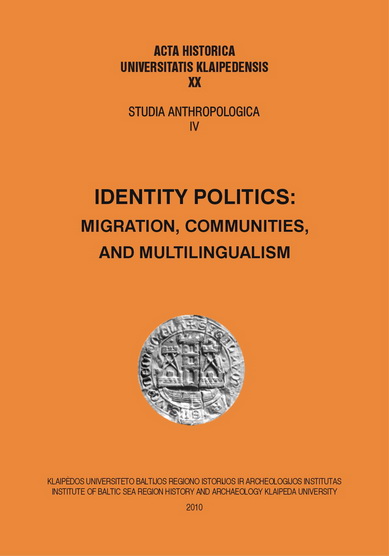Volume 20 (2010): Studia Anthropologica, IV: Identity Politics: Migration, Communities and Multilingualism, March 2010

Order by:
Pub. online: 5 Mar 2010
Type: Introduction
 Open Access
Open Access
Journal:
Acta Historica Universitatis Klaipedensis
Volume 20 (2010): Studia Anthropologica, IV: Identity Politics: Migration, Communities and Multilingualism, pp. 5–8
Pub. online: 5 Mar 2010
Type: Article
 Open Access
Open Access
Journal:
Acta Historica Universitatis Klaipedensis
Volume 20 (2010): Studia Anthropologica, IV: Identity Politics: Migration, Communities and Multilingualism, pp. 9–23
Abstract
Pub. online: 5 Mar 2010
Type: Article
 Open Access
Open Access
Journal:
Acta Historica Universitatis Klaipedensis
Volume 20 (2010): Studia Anthropologica, IV: Identity Politics: Migration, Communities and Multilingualism, pp. 24–36
Abstract
Pub. online: 5 Mar 2010
Type: Article
 Open Access
Open Access
Journal:
Acta Historica Universitatis Klaipedensis
Volume 20 (2010): Studia Anthropologica, IV: Identity Politics: Migration, Communities and Multilingualism, pp. 37–51
Abstract
Pub. online: 5 Mar 2010
Type: Article
 Open Access
Open Access
Journal:
Acta Historica Universitatis Klaipedensis
Volume 20 (2010): Studia Anthropologica, IV: Identity Politics: Migration, Communities and Multilingualism, pp. 52–71
Abstract
Pub. online: 5 Mar 2010
Type: Book Review
 Open Access
Open Access
Journal:
Acta Historica Universitatis Klaipedensis
Volume 20 (2010): Studia Anthropologica, IV: Identity Politics: Migration, Communities and Multilingualism, pp. 59–68
Pub. online: 5 Mar 2010
Type: Article
 Open Access
Open Access
Journal:
Acta Historica Universitatis Klaipedensis
Volume 20 (2010): Studia Anthropologica, IV: Identity Politics: Migration, Communities and Multilingualism, pp. 72–86
Abstract
Pub. online: 5 Mar 2010
Type: Article
 Open Access
Open Access
Journal:
Acta Historica Universitatis Klaipedensis
Volume 20 (2010): Studia Anthropologica, IV: Identity Politics: Migration, Communities and Multilingualism, pp. 87–98
Abstract
Pub. online: 5 Mar 2010
Type: Article
 Open Access
Open Access
Journal:
Acta Historica Universitatis Klaipedensis
Volume 20 (2010): Studia Anthropologica, IV: Identity Politics: Migration, Communities and Multilingualism, pp. 99–111
Abstract
Pub. online: 5 Mar 2010
Type: Article
 Open Access
Open Access
Journal:
Acta Historica Universitatis Klaipedensis
Volume 20 (2010): Studia Anthropologica, IV: Identity Politics: Migration, Communities and Multilingualism, pp. 112–122
Abstract